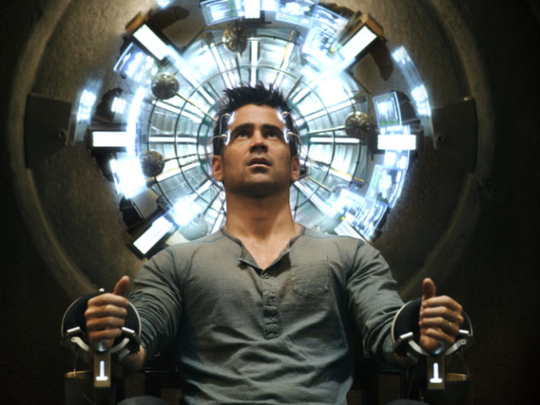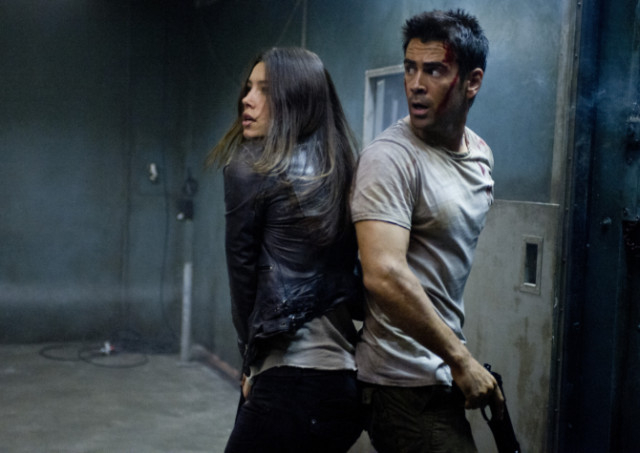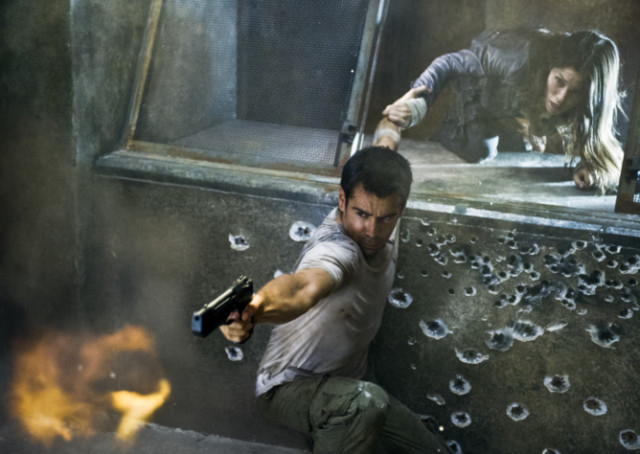
Colin Farrell replaces Arnold Schwarzenegger in the new version of “Total Recall,” and the smug sense of campy meanness that made the original 1990 film feel so muscular and grotesque gives way to a vibe that’s slick, shiny and deadly serious.
Seriously, this movie has no sense of humour — there are maybe two jokes, both of which are callbacks to the first movie.
Farrell doesn’t get to utter any corny one-liners as he rips off a bad guy’s arms. And maybe this is good, this attempt at reinvention.
It certainly makes director Len Wiseman’s film move more energetically and efficiently, at least until the repetitive and overlong ending: a barrage of anonymous automatic gunfire and heavy-duty explosions.
Both films are super violent — Paul Verhoeven’s came with an R-rating more than two decades ago because, well, he’s Paul Verhoeven — but less seems to be at stake in this latest version.
Farrell is certainly a better actor than Schwarzenegger and he’s capable of far more emotional complexity, but Schwarzenegger was better at conveying a sense of panic and fear, of discombobulation.
You actually felt for him as he struggled to piece together his past and tried to determine whom he could trust. Farrell is confident and competent regardless of the situation; there never seems to be any real threat of him coming out alive.
Like the original “Total Recall,” Wiseman’s film is based on the Philip K. Dick sci-fi short story “We Can Remember It for You Wholesale,” a futuristic exploration of memory and identity.
It’s the end of the 21st century, and chemical warfare has made most of Earth uninhabitable except for two regions: the briskly antiseptic United Federation of Britain and the grimy, crowded Colony, formerly known as Australia. (This version remains truer to Dick’s vision in that no one travels to Mars.) In one of the film’s coolest concepts, blue-collar workers travel each day on The Fall, a massive elevator that zooms through the Earth’s core from one place to the other in a matter of minutes.
The densely packed vertical urban sprawl of The Colony, a multicultural ghetto that’s kinda Japanese and kinda Russian and constantly rainy, is the impressively detailed, vividly rendered work of production designer Patrick Tatopoulos. It has an imposing, dreary grandeur reminiscent of “Blade Runner,” also based on Dick’s writing.
This is where Farrell’s Douglas Quaid lives with his beautiful wife, Lori (Kate Beckinsale, Wiseman’s real-life wife whom he directed in the first two “Underworld” movies). They share a dark, cramped apartment and he works a menial factory job he hates. But dreams of danger haunt him, and eventually inspire him to visit Rekall, a lab that offers sort of mini-vacations through implanted memories (a charismatic, silver-haired John Cho runs the place as a cross between scientist and game show host).
Things go wrong during the procedure, as we know, and Quaid quickly finds himself under attack, on the run and accused of being a totally different person. A freedom fighter named Melina (Jessica Biel), a lieutenant for the head of the underground resistance with whom he has some sort of romantic history, becomes his protector and guide (and makes a spectacular, breathless entrance in a hover car).
His life, as he’s known it, is not real — and that includes his marriage. One vast improvement here is that the women are stronger and fiercer than they were in the original; Rachel Ticotin’s Melina was the proverbial hooker with a heart of gold and Sharon Stone’s Lori was a sweetly passive housewife. Here, when Biel and Beckinsale square off against each other, it’s with all the skill and intensity of the men. Similarly, they don’t break a single bone as they scramble across rooftops and leap from one ridiculously perilous height after another.




